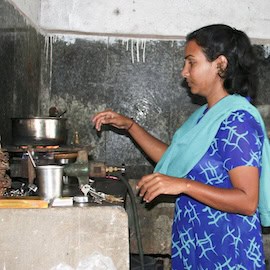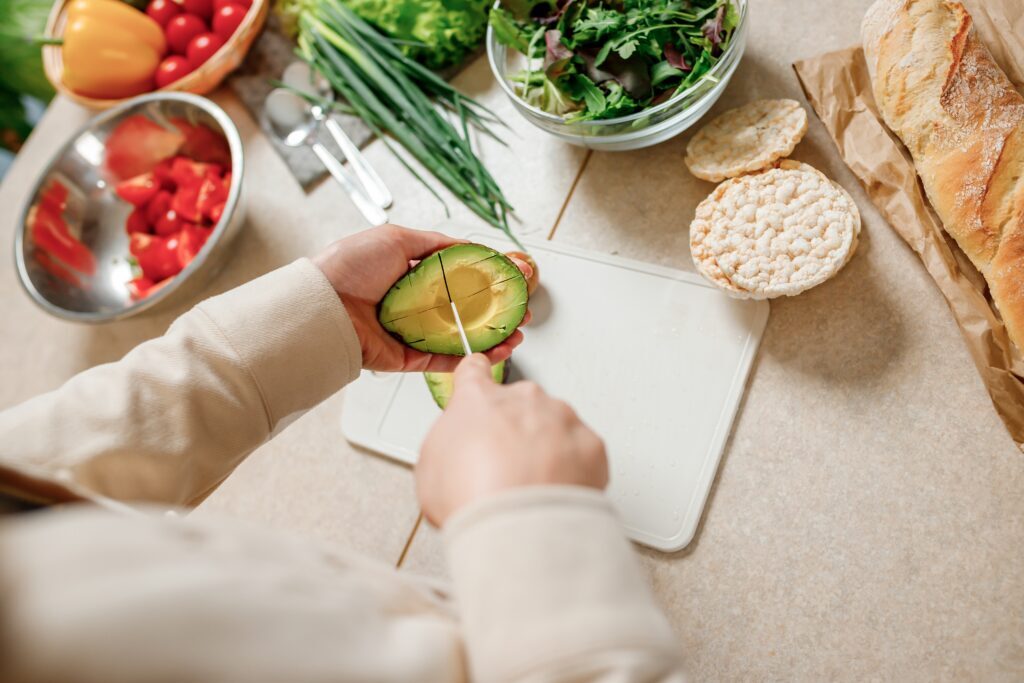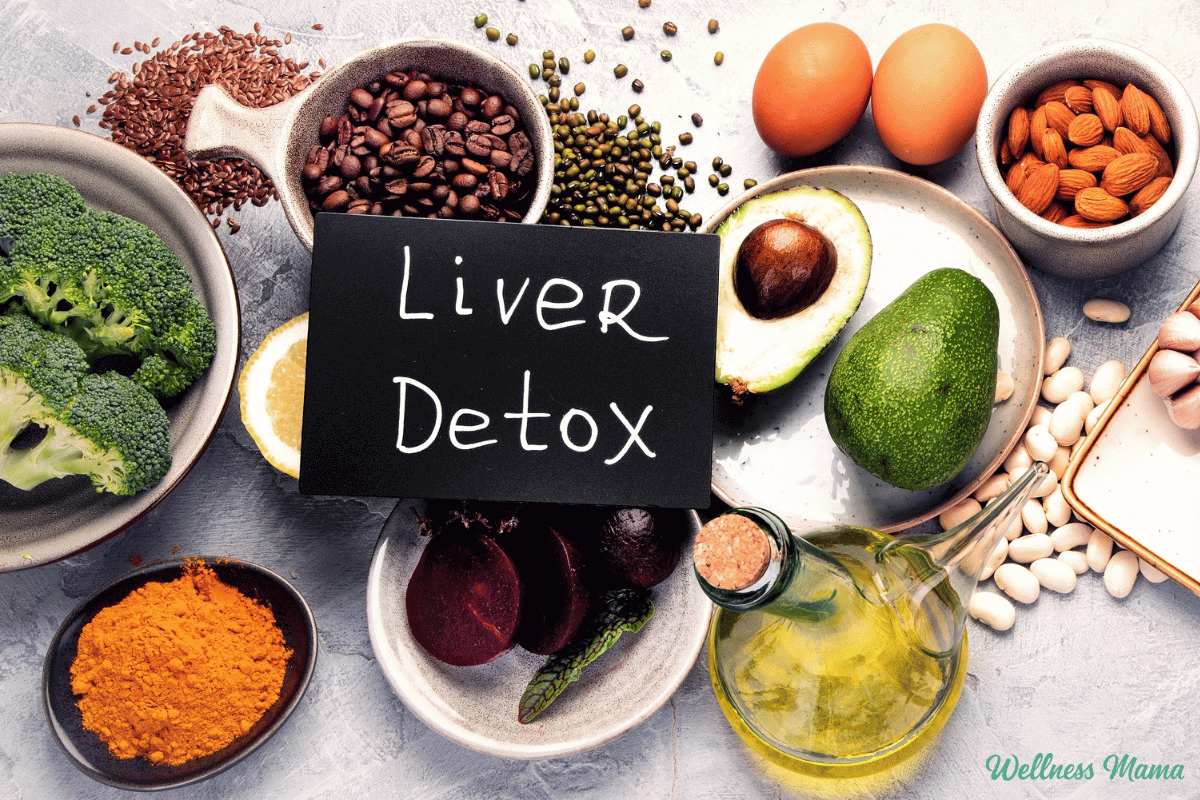Amid the serene locale of Balaghat — a small city in Madhya Pradesh, India — lives Sunita, a 45-year-old homemaker. Like many local residents, she used to cook food over a chulha, a traditional earthen stove fueled by firewood, coal and dung cakes. The crackling flames were her constant companion, but they brought more than warmth to her kitchen. Acquiring fuel for the fire was an ongoing burden for the household, and a steady stream of smoke and searing heat accompanied the flames, which left Sunita coughing and her eyes stinging — a harsh reality that extended to her children, too.
Then, in 2018, a glimmer of hope emerged in the form of free access to a clean gas cookstove and a refillable cylinder of liquefied petroleum gas (LPG) under the Indian government’s Pradhan Mantri Ujjwala Yojana (PMUY) program. With LPG, Sunita initially found respite from the smoke-filled haze, while reclaiming precious time for herself and her family. However, these improvements were short-lived, as the logistical challenges of LPG refills soon became apparent, adding both financial strain and inconvenience to her household.
Firstly, the program only provided the initial LPG cylinder free of charge, and the increasing cost of LPG refills added to the financial burden for her husband, who works as a smallholder farmer — especially during non-business seasons. Secondly, her village was located 25 km from the gas agency — outside of the catchment area where it made frequent deliveries — which led to delays of more than five days in receiving delivery of refilled cylinders. When this happened, Sunita had to rely on her husband to visit the agency for a refill, which took up almost half his day. As a result, their household was unable to obtain regular LPG refills and relied mostly on the biomass fuel they had used prior to the program.
The barriers to LPG adoption among rural households in India
As MSC has explored the barriers that hinder LPG cylinders’ adoption among individuals like Sunita, we’ve gained insights into the intricate challenges of rural households. MSC’s extensive research has unearthed three key factors that impede the regular refilling of LPG among rural communities:
- Accessibility challenges: The remoteness of rural areas poses logistical hurdles, which makes direct home deliveries impractical for LPG distributors without incentives. As a result, customers must retrieve cylinders from agencies, incurring extra costs, spending valuable time and facing considerable inconvenience.
- Financial challenges: The irregular income patterns prevalent in rural settings make it difficult for households to afford the recurring expense of LPG. This is particularly the case for those engaged in agriculture and wage labor. This financial instability often compels a shift toward cheaper biomass or solid fuels as substitutes.
- Cultural conditioning: Deep-rooted cultural and taste preferences for cooking over traditional chulhas contribute to the resistance to LPG adoption. Many households perceive biomass as abundant and cost-free, which undermines the perceived desirability of switching to LPG. Moreover, a prevalent lack of awareness of safety practices around LPG further reinforces the reluctance among rural customers.
MSC has tackled these challenges in LPG access through a program, facilitated by Bharat Petroleum Corporation Limited, that leverages the hundreds of thousands of self-help groups (SHGs) in operation across Madhya Pradesh, which reach 4 million rural households. A Self-Help Group is a village-based group of 10-20 individuals (women in this case) who contribute small regular savings to create a fund. Members borrow from this fund when needed, and SHGs with good financial discipline are linked to banks for credit, which they then on-lend to their members. Recognizing that this extensive SHG ecosystem could help significantly boost the uptake of LPG cooking, we worked with the Madhya Pradesh State Rural Livelihood Mission and the Ministry of Petroleum and Natural Gas to develop a need-based microloan product that has enabled SHG members to afford LPG cylinders regularly.
Scaling up a successful pilot program to boost LPG access
We initially offered this loan product through a limited pilot program that reached 100 SHG members. Then after those loans were repaid successfully, we worked with our partners to scale up the program in Madhya Pradesh, giving the program and the loans a formal name: the Ujjwala Sakhi initative and the Ujjwala loan product.
Ujjwala Sakhis are all women entrepreneurs and members of SHGs: We decided to exclusively work with women due to their central role in household chores, and in the culturally rooted barriers to LPG adoption, which often require a trusted, community-based approach to overcome. The SHG network provided a great platform to leverage this community model. As change agents, Ujjwala Sakhis play a pivotal role in addressing barriers related to accessibility and cultural norms around LPG usage. These women educate households about the benefits of LPG, facilitate the refilling process, and provide support to overcome traditional cooking preferences. In addition to these roles, Ujjwala Sakhis also help community members access the Ujjwala loan product. They assist SHG members in applying for the loan, ensuring that they understand the loan terms, and guiding them through the process of securing timely and affordable credit.
Throughout our efforts to scale this intervention, MSC developed three primary initiatives to address challenges related to LPG refilling:
- Offering Ujjwala loans: These are small-ticket loans available to the SHG members. The loan amount covers the LPG refill cost, as paid to the distributor that provides the gas. The customer can repay the loan to the SHG over the course of three months.
- Organizing awareness campaigns: Ujjwala Sakhis and LPG marketing companies organize awareness camps to overcome cultural barriers to regular gas refills, and to educate communities about safety practices they should follow when using LPG. These campaigns help to overcome community members’ fear of using LPG and related accessories, while highlighting the health risks of smoke from biomass stoves.
- Appointing Ujjwala Sakhis to improve accessibility: Ujjwala Sakhis are SHG members, recruited as the agents to facilitate last-mile delivery of LPG refills and LPG gas accessories. Ujjwala Sakhis keep up to seven LPG cylinders at their location (the maximum allowed, according to safe storage regulations), which makes them easily accessible to villagers. Customers can call or visit the Sakhi any time to buy an LPG refill. As a result, they no longer have to spend time and money traveling to a distant agency to obtain a refill. Ujjwala Sakhis purchase these LPG cylinders at a discounted price from the distributor and sell them to customers at the market price. Usually, the difference between the market price and the discounted price constitutes the Ujjwala Sakhi’s incentive or commission for each LPG refill sale. In addition, they receive commissions for conducting campaigns to educate their community members on the benefits and usage of LPG refills, as well as for selling LPG accessories. Through this model, women entrepreneurs not only earn income but also gain recognition and respect within their communities, contributing to their economic and social empowerment.
MSC has been spearheading the Ujjwala Sakhi intervention across 28 districts in Madhya Pradesh in partnership with LPG marketing companies and the Madhya Pradesh State Rural Livelihood Mission. Approximately 1,000 women from SHGs in Madhya Pradesh have been enlisted as Ujjwala Sakhis. These individuals undergo training and orientation programs on an ongoing basis. After selection, they can start operations, after signing a Memorandum of Understanding with the local gas agency in their respective areas.
Positive impacts across LPG promotion, women’s empowerment, health, livelihoods and climate
Ujjwala Sakhis play a crucial role in promoting the use of cleaner fuel in India’s rural regions. As of September 2024, their efforts have facilitated more than 449,351 LPG refills in Madhya Pradesh within the program’s 35 months of operation. Thanks to the Ujjwala loans made accessible through the SHGs, LPG has become more affordable for rural customers, with more than 12,000 loans disbursed in the state by September 2024.
The Ujjwala Sakhi intervention primarily addresses the challenges of low or no uptake of LPG refills among rural communities. Yet it also has far-reaching impacts across multiple additional dimensions:
- Women’s empowerment: It has strengthened women’s agency and alleviated drudgery for rural women.
- Health promotion: It has prevented illnesses caused by harmful emissions from solid fuels.
- Livelihood enhancement: It has created sustainable and market-linked income sources for women in SHGs.
- Climate action: It has promoted the use of cleaner energy, which has reduced indoor air pollution and carbon emissions and mitigated deforestation.
- Social value addition: It has enhanced the effectiveness of the Pradhan Mantri Ujjwala Yojana.
Impact in numbers:
Today, with the support of the Ujjwala program and Ujjwala Sakhis, Sunita now cooks with an LPG stove, her kitchen liberated from the threat of pollution from burning solid fuels, her family’s health protected, and her aspirations kindled with newfound opportunities. With the time they save from not needing to gather and cook with biomass, Sunita and women like her are able to focus on income-generating activities, education or other personal goals, enabling them to enhance their economic independence and overall well-being.
To bring these benefits to more households, MSC is scaling the Ujjwala Sakhi initiative nationally, aiming to impact over 100,000 women in the next three years. Building on our efforts in Madhya Pradesh, we will lead the nationwide rollout with support from key stakeholders. The initiative offers substantial economic benefits and significant environmental impact, providing access to clean cooking fuel and livelihood opportunities, and promoting environmental stewardship. We also plan to explore carbon credit opportunities to sustain and incentivize these outcomes in the near future.
Shobhit Mishra is a Senior Manager in MSC’s Inclusive Banking and Enterprise Development domain, and Vaishaly Shrimall is an Assistant Manager at MSC.
Photo credit: Diego Wyllie
Publisher: Source link






